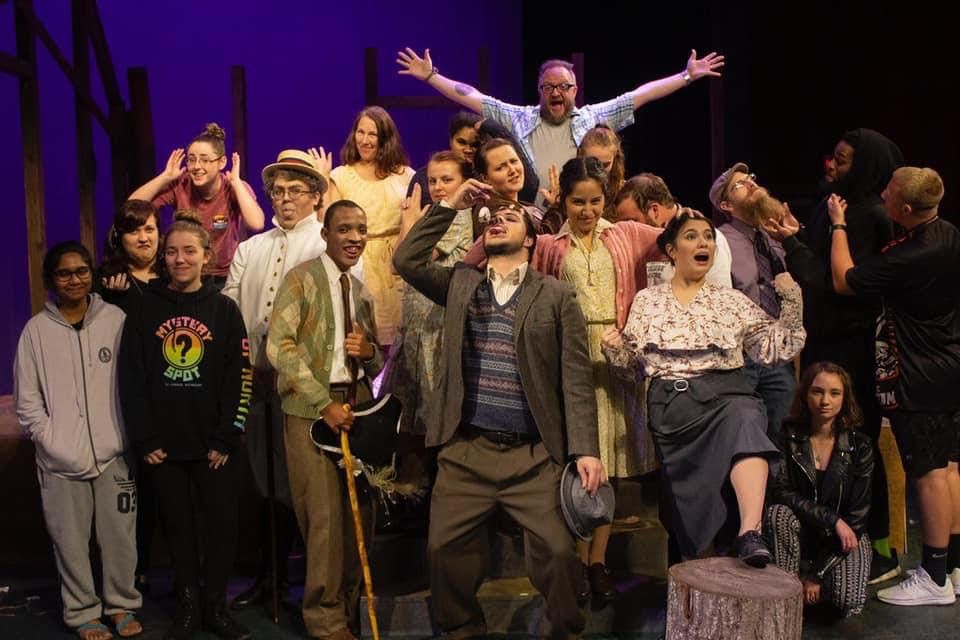
As a veteran theatre maker and educator at Lycoming College, Dr. Chris Hill had to make a choice at the start of COVID-19: Should he lay down and stop creating, or use this time as an opportunity for artistic growth? Anyone who knows Hill wouldn’t be surprised that he chose the latter. This fall, he is helping his department embrace the joys and challenges of making theatre during a pandemic the best way he knows how — by directing a self-written version of August Stringberg’s three-person play, The Dance of Death.
Choosing the eerily named work for Lycoming’s only production of the 2020 season — currently set to have one private, live performance before being virtually released to the public on Nov. 10 — was no coincidence. When the college went remote in March, Hill and his colleagues racked their brains for a fall show that would speak to the emotion of the pandemic, use a small cast and be flexible enough to move to Zoom if need be.
The Dance of Death, a hyper-naturalist play written in 1900 about an unhappily married couple about to celebrate their 25th wedding anniversary while living in an old prison on the middle of an island, fit the bill for all three qualifications.
“It’s a play that lends itself to physical distance,” Hill explained. “These are people that do not want to be close to each other physically. . . They’re gonna sit as far away from each other as they can in the room because they really can’t stand each other.”
Because the original script was written over a hundred years ago — in Swedish, Hill adds — it is now in the public domain. After looking at several other English translations, Hill was disappointed to find that none of them highlighted the elements of the play on which he wanted to focus. So he decided to write his own, balancing his own understanding of the play with the goal to honor Strindberg’s work.
“Everything is exactly as Strindberg intended it,” Hill said. “That was key to me. What I did is not an adaptation — it’s more like a translation. But that feels gross, because I didn’t translate it from Swedish myself. . . It’s just a new version.”
The show must go on
Hill serving as playwright doesn’t only benefit the script — it also secures the flexibility of the production. In the event that Lycoming needs to go remote again, Hill doesn’t need anyone’s permission to switch to an online rehearsal and performance model, complete with design elements. Though Hill certainly would rather have a live performance filmed by the college’s Film and Video Arts Department as planned, he is proud to have this as a viable Plan B.
For now, he plans to have his small cast rehearse in face masks, 6 feet apart. Jay Innerarity, head of Design and Technical Theatre at Lycoming, is collaborating with several professional theatres and theatre educators across the country to compile a list of safety protocols for the company to follow.
“We refuse to put anybody at risk,” Hill said, shaking his head. “Before we would (do that), we would not do a production. But that just doesn’t seem necessary to take that step. I think we can do better than that.”
Adapting at Lycoming
As excited as Hill is to be back on campus, learning with his theatre students, he is the first to admit the back-to-school vibe is much different this year. From department scuttlebutt, he’s learned that many of his students feel anxious that this time with one another won’t last.
“(They’re) scared to death that while we’re all going to follow the rules and guidelines as best we can to keep ourselves and each other safe, there are others that aren’t doing that work,” Hill said. “News stories about giant parties at Penn State don’t help. That’s the quickest way to lose this opportunity to be back together right now.”
Other vibes may have to do with the uncertain future of the industry itself. With Broadway shut down until 2021 and theaters across the country following suit, Hill guesses some of his students feel nervous that the art they’re being trained to master might soon be obsolete. Luckily, Hill remains adamant that this is not the case.
“Right now, we all need to be able to see each other, hear each other and understand each other,” he said. “(We need to) give up our own comfort in service of one another. Theatre has done that since theatre was invented. And we have a way of showing the rest of the world exactly how to do these things. It’s what we do.”




